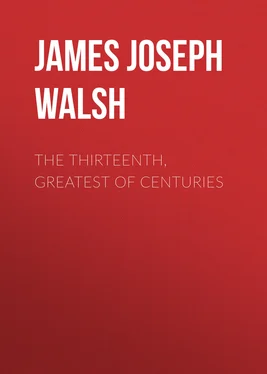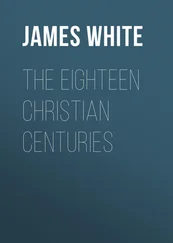James Walsh - The Thirteenth, Greatest of Centuries
Здесь есть возможность читать онлайн «James Walsh - The Thirteenth, Greatest of Centuries» — ознакомительный отрывок электронной книги совершенно бесплатно, а после прочтения отрывка купить полную версию. В некоторых случаях можно слушать аудио, скачать через торрент в формате fb2 и присутствует краткое содержание. Жанр: foreign_prose, История, foreign_edu, foreign_antique, на английском языке. Описание произведения, (предисловие) а так же отзывы посетителей доступны на портале библиотеки ЛибКат.
- Название:The Thirteenth, Greatest of Centuries
- Автор:
- Жанр:
- Год:неизвестен
- ISBN:нет данных
- Рейтинг книги:3 / 5. Голосов: 1
-
Избранное:Добавить в избранное
- Отзывы:
-
Ваша оценка:
- 60
- 1
- 2
- 3
- 4
- 5
The Thirteenth, Greatest of Centuries: краткое содержание, описание и аннотация
Предлагаем к чтению аннотацию, описание, краткое содержание или предисловие (зависит от того, что написал сам автор книги «The Thirteenth, Greatest of Centuries»). Если вы не нашли необходимую информацию о книге — напишите в комментариях, мы постараемся отыскать её.
The Thirteenth, Greatest of Centuries — читать онлайн ознакомительный отрывок
Ниже представлен текст книги, разбитый по страницам. Система сохранения места последней прочитанной страницы, позволяет с удобством читать онлайн бесплатно книгу «The Thirteenth, Greatest of Centuries», без необходимости каждый раз заново искать на чём Вы остановились. Поставьте закладку, и сможете в любой момент перейти на страницу, на которой закончили чтение.
Интервал:
Закладка:
The moment when this interaction might have seemed on the point of reaching a complete and harmonious result was the glorious thirteenth century, the culminating moment of the Holy Roman Empire. Then, as in the times of Caesar or Trajan, there might have seemed to be a union among civilized men, in which the separate life of individuals and localities was not submerged. In that golden age, alike of feudal system of empire and of Church, there were to be seen the greatest monarchs, in fullest sympathy with their peoples, that Christendom has ever known—an Edward I, a St. Louis, a Frederick II. Then when in the Pontificates of Innocent III and his successors the Roman Church reached its apogee, the religious yearning of men sought expressions in the sublimest architecture the world has seen. Then Aquinas summed up in his profound speculations the substance of Catholic theology, and while the morning twilight of modern science might be discerned in the treatises of Roger Bacon, while wandering minstrelsy revealed the treasures of modern speech, soon to be wrought under the hands of Dante and Chaucer into forms of exquisite beauty, the sacred fervor of the apostolic ages found itself renewed in the tender and mystic piety of St. Francis of Assisi. It was a wonderful time, but after all less memorable as the culmination of medieval empire and medieval church than as the dawning of the new era in which we live to-day.
While wave after wave of Germanic colonization poured over Romanized Europe, breaking down old boundary lines and working sudden and astonishing changes on the map, setting up in every quarter baronies, dukedoms, and kingdoms fermenting with vigorous political life; while for twenty generations this salutary but wild and dangerous work was going on, there was never a moment when the imperial sway of {xv} Rome was quite set aside and forgotten, there was never a time when union of some sort was not maintained through the dominion which the Church had established over the European mind. When we duly consider this great fact in its relations to what went before and what came after, it is hard to find words fit to express the debt of gratitude which modern civilization owes to the Roman Catholic Church. When we think of all the work, big with promise of the future, that went on in those centuries which modern writers in their ignorance used once to set apart and stigmatize as the "Dark Ages"; when we consider how the seeds of what is noblest in modern life were then painfully sown upon the soil which Imperial Rome had prepared; when we think of the various work of a Gregory, a Benedict, a Boniface, an Alfred, a Charlemagne, we feel that there is a sense in which the most brilliant achievements of pagan antiquity are dwarfed in comparison with these. Until quite lately, indeed, the student of history has had his attention too narrowly confined to the ages that have been pre-eminent for literature and art—the so-called classical ages—and thus his sense of historical perspective has been impaired.—Fiske, The Beginnings of New England, or The Puritan Theocracy in its Relations to Civil and Religions Liberty .
I
INTRODUCTION
It cannot but seem a paradox to say that the Thirteenth was the greatest of centuries. To most people the idea will appear at once so preposterous that they may not even care to consider it. A certain number, of course, will have their curiosity piqued by the thought that anyone should evolve so curious a notion. Either of these attitudes of mind will yield at once to a more properly receptive mood if it is recalled that the Thirteenth is the century of the Gothic cathedrals, of the foundation of the university, of the signing of Magna Charta, and of the origin of representative government with something like constitutional guarantees throughout the west of Europe. The cathedrals represent a development in the arts that has probably never been equaled either before or since. The university was a definite creation of these generations that has lived and maintained its usefulness practically in the same form in which it was then cast for the seven centuries ever since. The foundation stones of modern liberties are to be found in the documents which for the first time declared the rights of man during this precious period.
A little consideration of the men who, at this period, lived lives of undying influence on mankind, will still further attract the attention of those who have not usually grouped these great characters together. Just before the century opened, three great rulers died at the height of their influence. They are still and will always be the subject of men's thoughts and of literature. They were Frederick Barbarossa, Saladin, and Richard Coeur De Lion. They formed but a suggestive prelude of what was to come in the following century, when such great monarchs as St. Louis of France, St. Ferdinand of Spain, Alfonso the Wise of Castile, Frederick II of Germany, Edward I, the English Justinian, Rudolph of Hapsburg, whose descendants still rule in Austria, and Robert Bruce, occupied the thrones of Europe. Was it by chance or Providence that the same century saw the rise of and the beginning of the fall of that great Eastern monarchy which had been created by the genius for conquest of Jenghiz Khan, the Tartar warrior, who ruled over all the Eastern world from beyond what are now the western confines of Russia, Poland, and Hungary, into and including what we now call China.
But the thrones of Europe and of Asia did not monopolize the great men of the time. The Thirteenth Century claims such wonderful churchmen as St. Francis and St. Dominic, and while it has only the influence of St. Hugh of Lincoln, who died just as it began, it can be proud of St. Edmund of Canterbury, Stephen Langton, and Robert Grosseteste, all men whose place in history is due to what they did for their people, and such magnificent women as Queen Blanche of Castile, St. Clare of Assisi, and St. Elizabeth of Hungary. The century opened with one of the greatest of the Popes on the throne, Innocent III, and it closed with the most misunderstood of Popes, who is in spite of this one of the worthiest successors of Peter, Boniface VIII. During the century there had been such men as Honorius IV, the Patron of Learning, Gregory IX, to whom Canon Law owes so much, and John XXI, who had been famous as a scientist before becoming Pope. There are such scholars as St. Thomas of Aquin, Albertus Magnus, Roger Bacon, St. Bonaventure, Duns Scotus, Raymond Lully, Vincent of Beauvais, and Alexander of Hales, and such patrons of learning as Robert of Sorbonne, and the founders of nearly twenty universities. There were such artists as Gaddi, Cimabue, and above all Giotto, and such literary men as the authors of the Arthur Legends and the Nibelungen, the Meistersingers, the Minnesingers, the Troubadours, and Trouvères, and above all Dante, who is universally considered now to be one of the greatest literary men of all times, but who was not, as is so often thought and said, a solitary phenomenon in the period, but only the culmination of a great literary movement that had to have some such supreme expression of itself as this in order to properly round out the cycle of its existence.
If in addition it be said that this century saw the birth of the democratic spirit in many different ways in the various countries of Europe, but always in such form that it was never quite to die out again, the reasons for talking of it as possibly the greatest of centuries will be readily appreciated even by those whose reading has not given them any preliminary basis of information with regard to this period, which has unfortunately been shrouded from the eyes of most people by the fact, that its place in the midst of the Middle Ages would seem to preclude all possibility of the idea that it could represent a great phase of the development of the human intellect and its esthetic possibilities.
Читать дальшеИнтервал:
Закладка:
Похожие книги на «The Thirteenth, Greatest of Centuries»
Представляем Вашему вниманию похожие книги на «The Thirteenth, Greatest of Centuries» списком для выбора. Мы отобрали схожую по названию и смыслу литературу в надежде предоставить читателям больше вариантов отыскать новые, интересные, ещё непрочитанные произведения.
Обсуждение, отзывы о книге «The Thirteenth, Greatest of Centuries» и просто собственные мнения читателей. Оставьте ваши комментарии, напишите, что Вы думаете о произведении, его смысле или главных героях. Укажите что конкретно понравилось, а что нет, и почему Вы так считаете.












